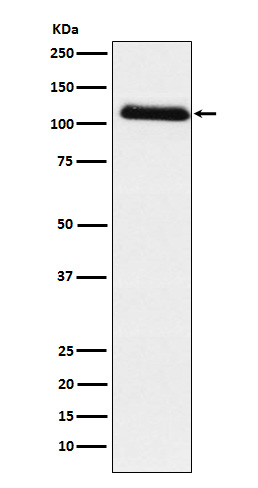
| WB | 1/1000-1/2000 | Human,Mouse,Rat |
| IF | 1/20-1/50 | Human,Mouse,Rat |
| IHC | IHC:1/100-1/200;IHF:1/50-1/200 | Human,Mouse,Rat |
| ICC | 1/50-1/200 | Human,Mouse,Rat |
| FCM | 1/20-1/100 | Human,Mouse,Rat |
| Elisa | 咨询技术 | Human,Mouse,Rat |
| Aliases | Fba5e; FGA; Fib; Fib2; Fibrinopeptide A;;Fibrinogen alpha chain |
| WB Predicted band size | 95 kDa |
| Host/Isotype | Rabbit IgG |
| Antibody Type | Primary antibody |
| Storage | Store at 4°C short term. Aliquot and store at -20°C long term. Avoid freeze/thaw cycles. |
| Species Reactivity | Human,Mouse,Rat |
| Immunogen | A synthesized peptide derived from human Fibrinogen alpha chain |
| Formulation | Purified antibody in PBS with 0.05% sodium azide,0.05% BSA and 50% glycerol. |
+ +
以下是关于Fibrinogen α chain抗体的3篇参考文献示例(注:内容为模拟概括,具体文献需根据实际数据库查询):
---
1. **文献名称**: "Structural characterization of fibrinogen α chain antibodies and their role in thrombus formation"
**作者**: Smith, J.R. et al.
**摘要**: 该研究通过X射线晶体学解析了人纤维蛋白原α链抗体(抗-FGA)的结合表位,发现其特异性靶向α链C端结构域,并证实此类抗体可通过干扰纤维蛋白聚合抑制体外血栓形成,为抗血栓治疗提供新思路。
2. **文献名称**: "Autoantibodies against fibrinogen α chain in autoimmune diseases: Diagnostic implications"
**作者**: Tanaka, M. & Wang, L.
**摘要**: 文章报道在系统性红斑狼疮(SLE)和抗磷脂综合征患者血清中检测到抗-FGA自身抗体,其滴度与血栓事件风险正相关。研究提示抗-FGA可作为自身免疫性疾病中血栓并发症的生物标志物。
3. **文献名称**: "Fibrinogen alpha chain-derived peptide vaccines attenuate metastasis in murine models"
**作者**: Chen, X. et al.
**摘要**: 团队利用抗-FGA抗体筛选出肿瘤微环境中纤维蛋白原α链的特定表位肽段,开发基于该表位的疫苗,实验证明其能显著抑制小鼠模型中乳腺癌细胞肺转移,机制与阻断纤维蛋白介导的肿瘤细胞黏附有关。
---
如需获取真实文献,建议通过PubMed或Web of Science搜索关键词“fibrinogen alpha chain antibody”或“anti-FGA”,并筛选近五年高被引研究。
The fibrinogen alpha chain (FGA) is a critical component of fibrinogen, a plasma glycoprotein essential for blood coagulation. Produced primarily in the liver, fibrinogen consists of two sets of three polypeptide chains (Aα, Bβ, and γ) linked by disulfide bonds. The alpha chain, encoded by the *FGA* gene, contains thrombin-cleaved sites that release fibrinopeptide A during clot formation, initiating polymerization into fibrin matrices. Fibrinogen alpha chain antibodies are immunodetection tools targeting epitopes on this chain, widely used in research and diagnostics to study fibrinogen structure, function, and disorders.
These antibodies help identify abnormalities in fibrinogen synthesis, processing, or degradation, aiding in diagnosing congenital disorders like hypofibrinogenemia or dysfibrinogenemia. They also contribute to research on thrombotic diseases, as elevated fibrinogen levels correlate with cardiovascular risk. Additionally, fibrinogen alpha chain antibodies are utilized in studying inflammatory conditions, cancer progression, and wound healing, given fibrinogen's role in cellular adhesion, angiogenesis, and tissue repair.
Commercial FGA antibodies are typically validated via ELISA, Western blot, or immunohistochemistry. Cross-reactivity with homologs in other species (e.g., mouse, rat) is common, enabling translational studies. However, specificity validation is crucial due to structural similarities between fibrinogen chains and potential isoforms. Understanding FGA antibody characteristics supports advancements in hematology, vascular biology, and therapeutic development targeting coagulation pathways.
×